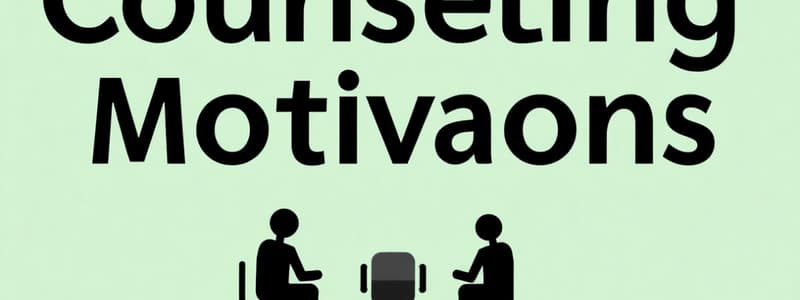Podcast
Questions and Answers
What is a potentially negative reason for becoming a counselor?
What is a potentially negative reason for becoming a counselor?
- Belief in the importance of client autonomy
- Commitment to understanding specialized knowledge
- Urgent need to solve personal problems (correct)
- Desire to help those less fortunate
Which characteristic positively influences counseling outcomes by acknowledging client capabilities?
Which characteristic positively influences counseling outcomes by acknowledging client capabilities?
- Expressing judgments about client decisions
- Displaying frustration during sessions
- Conveying belief in the client's worthiness (correct)
- Ignoring cultural differences
Which interpersonal dimension is essential for effective counseling according to the counselor's self-awareness?
Which interpersonal dimension is essential for effective counseling according to the counselor's self-awareness?
- Having a dominant personality
- Being overly empathetic at all times
- Understanding one's own biases (correct)
- Being highly directive and controlling
What aspect of effective counseling involves maintaining professional knowledge?
What aspect of effective counseling involves maintaining professional knowledge?
How does cultural sensitivity manifest as a characteristic of an effective counselor?
How does cultural sensitivity manifest as a characteristic of an effective counselor?
Which characteristic best differentiates an effective counselor from someone focused solely on self-glorification?
Which characteristic best differentiates an effective counselor from someone focused solely on self-glorification?
What is a key trait that allows counselors to effectively manage their client's emotional health?
What is a key trait that allows counselors to effectively manage their client's emotional health?
Which characteristic reflects a counselor's capacity for personal growth?
Which characteristic reflects a counselor's capacity for personal growth?
How does a self-actualizing person demonstrate empathy and compassion?
How does a self-actualizing person demonstrate empathy and compassion?
Which of the following reflects a misconception about the nature of effective counselors?
Which of the following reflects a misconception about the nature of effective counselors?
Flashcards
Effective Counselor Characteristics
Effective Counselor Characteristics
Effective counselors possess interpersonal skills like active listening, empathy, and validation of the client's experiences. They also display self-awareness, cultural sensitivity, and ethical conduct.
Counselor Motivation
Counselor Motivation
People become counselors for various reasons, often including a genuine desire to help, address societal issues, or facilitate personal growth in others.
Negative Motivations in Counseling
Negative Motivations in Counseling
Some counselors may be motivated by personal needs or desires for power or control, rather than a genuine interest in the client’s well-being.
Counselor Self-Awareness
Counselor Self-Awareness
Signup and view all the flashcards
Continuing Education in Counseling
Continuing Education in Counseling
Signup and view all the flashcards
Self-actualized counselor characteristics
Self-actualized counselor characteristics
Signup and view all the flashcards
Effective counselor traits (energy)
Effective counselor traits (energy)
Signup and view all the flashcards
Effective counselor emotional resilience
Effective counselor emotional resilience
Signup and view all the flashcards
Counselors and intimacy
Counselors and intimacy
Signup and view all the flashcards
Counselors as risk-takers
Counselors as risk-takers
Signup and view all the flashcards
Study Notes
Reasons People Become Counselors
- Most believe they can help people.
- Some want to help those less fortunate.
- Some want to prevent difficulties.
- Some want to help people reach their full potential.
Potential Negative Reasons for Becoming a Counselor
- Counselors wanting to make a difference but having unrealistic expectations.
- Counselors needing to care for others, potentially undermining client autonomy by doing too much.
- Counseling students needing to solve their own problems.
- Counselors having a need for power or influence.
Counselor Interpersonal Dimensions Affecting Counseling Outcomes
- Ability to listen and convey understanding without judgment.
- Ability to be sensitive, empathic, and patient.
- Ability to convey that the counselor values the client's experiences.
- Ability to convey belief in the client's capability, trustworthiness, respectability, worth, and dependability.
Positive Counseling Outcomes (continued)
- Demonstrating positive self-belief and self-esteem.
- Self-awareness of biases and prejudices, and ability to analyze feelings.
- Sensitivity to cultural differences.
- Tolerance for ambiguity.
- Ability to model appropriate behaviors.
- Ability to be altruistic.
- Ethical conduct.
- Using oneself as a vehicle of change.
- Committed to understanding specialized knowledge, finding it personally meaningful.
- Staying current in professional knowledge through continuous learning.
- Respecting client worldview, experiences, spirituality, and culture.
- Having good self-care strategies.
Characteristics of the Self-Actualizing Person
- Tolerates doubt, uncertainty, and ambiguity; recognizes dishonesty.
- Honest, genuine, accepting of self and others' flaws.
- Possessing internal motivation and seeking growth instead of external approval.
- Choosing to help others out of concern rather than self-glorification.
- Enjoying solitude and not being stressed by others.
- Deriving happiness from growth and internal rewards, not external recognition.
- Having wonder about the world.
- Possessing deep empathy and compassion for others.
- Having deep, meaningful interpersonal relationships.
- Not being racist or discriminatory.
- Being highly ethical.
- Having a good sense of humor that isn't hurtful.
- Having unique creativity.
- Being involved in causes outside of oneself.
Additional Characteristics of Counselors
- Needing a high level of energy to remain alert and attentive to clients.
- Taking risks and facing rejection by clients or difficult situations.
- Facing ambiguity and ability to handle it.
- Developing intimate relationships with clients who share personal and meaningful material.
Studying That Suits You
Use AI to generate personalized quizzes and flashcards to suit your learning preferences.




